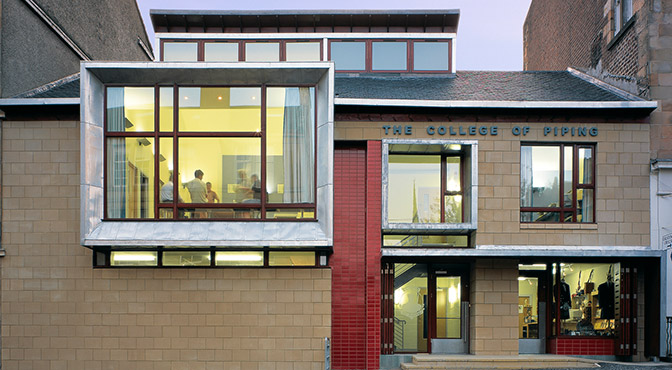Just when things seemed to be settling down at the College of Piping we hear of another departure, that of General Manager Fraser MacInnes, writes the Editor. My information is that the parting was not as harmonious as it might have been.
There must have been personality issues here for, according to the Office of Scottish Charities Register (OSCR), the College’s profit last year was £21,000. The old place seemed to be doing alright under Mr MacInnes’s guidance, however business will now be conducted jointly by Piping Times Editor Stuart Letford and Piping Director Colin MacLellan with the firm hand of Chairman Colin MacNeill conducting traffic from Edinburgh.
Unconfirmed rumours are that the College’s magazine, the Piping Times, has seen a fall in circulation to under 600 per month. This would give it a readership of 2,400 max. but the decline is not surprising and is in line with what is happening in many other areas of print journalism. (The Scotsman newspaper only sells 19,000 copies a day from a heyday high of more than four times that only a few years ago). The only way to counteract the online onslaught is with excellence in content and quality writing. You have to make the product unique and worth buying. We can contrast the PT readership with that of Piping Press (and I’m sure other online piping magazines) where the monthly viewing figures are a minimum of TEN times the PT total. Not hubris; fact. But people like a paper read. If a magazine is good enough it will sell (Economist, Private Eye, Spectator), so there is hope for the PT.
[wds id=”6″]
The other way it could hit back would be by becoming a free offering; print thousands, flood the market. That way you boost circulation and keep the advertisers happy. The downside is that there is no income from the cover price and, given the international nature of the piping and pipe band worlds, there are hefty mailing charges to consider. PT cover price income is already pretty low and when added to advertising revenue will, from my calculations, hardly be covering the current editor’s salary never mind paying for the print run.
The College’s overall wages bill must be pretty high too. My unconfirmed information is that the Director of Piping is being paid £10,000 a year for one day a week, though it has to be said that when I was there I found my responsibilities were 24/7 so it would be wrong to assess his salary on a strict time basis.
I hope the new arrangement works for the College and it is about time those great supporters of piping, the William Grant Foundation (WGF), offered them some funding. Here we have an institution (the College) dedicated to teaching piping at grass-roots level, not only at home but abroad, with an unparalelled record in offering lessons for free to disadvantaged youngsters. Yet the Foundation continues to ignore it just as its predecessors at Glenfiddich did. This was a recurring annoyance for me during my 15 years at Otago Street, why should the National Piping Centre (NPC) get all the cash? the repeated refrain.
According to OSCR the National Piping Centre showed a surplus of circa. £12,000 in 2016. Income streams included £250,000 from the Scottish Government’s agency Creative Scotland (£100,000 for the National Youth Pipe Band of Scotland) and £150,000 from Glenfiddich.
Recently there was a hush-hush meeting convened to discuss the Foundation’s future funding of piping with emphasis on solo competitions. I presume the College was invited to this pow-wow, or at least sent a copy of the detailed discussion document prepared by NPC Director of Piping Roderick MacLeod.
[wds id=”13″]
